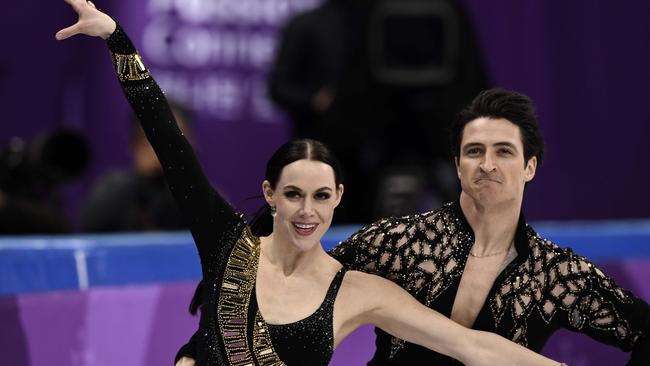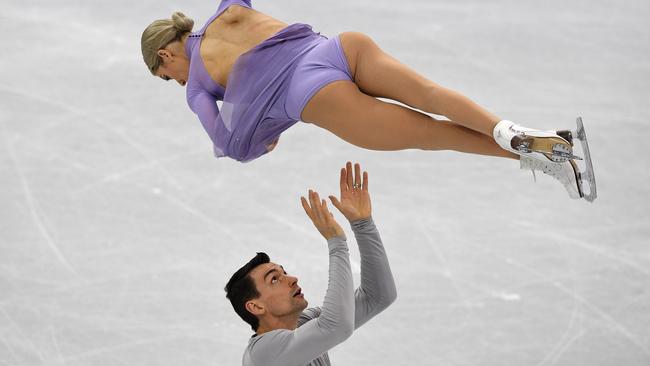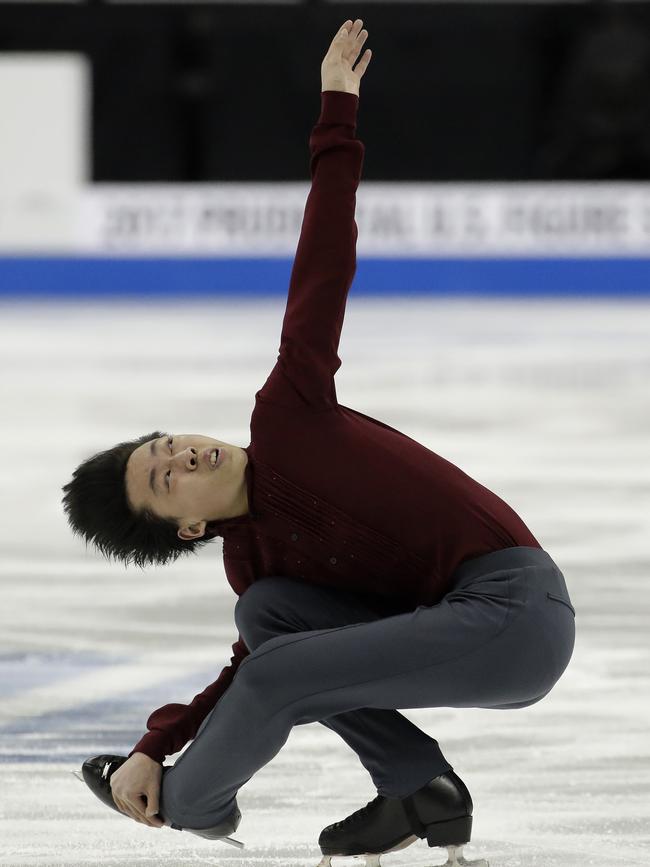Figure skaters caught in a loop
For the first time this Olympics, skaters can perform to music with lyrics. Why did so many pick from the same movie soundtrack?

Vincent Zhou had a problem. When the American figure skater scrapped his long program right before this season, he needed new music, and it needed to be good enough to carry him in an Olympic year. He experimented with several pieces in the canon of skating music before he found the one that felt right.
It was a medley from the soundtrack of Moulin Rouge!
The oddest thing about Zhou skating to “Nature Boy” and “Your Song” from Moulin Rouge!, the Baz Luhrmann movie musical set in the famous Paris cabaret, is that it’s not even the slightest bit odd. Songs from Moulin Rouge! will be playing on repeat at the 2018 Olympics. The jukebox musical romantic comedy from 2001 has become the soundtrack of an entire sport this season.
“Everybody and their uncle is skating to Moulin Rouge!,” said up-and-coming American ice dancer Joe Johnson, who skated this season to Moulin Rouge!

These are the first Winter Games that all figure skaters can perform to music with lyrics and not merely instrumentals. They can choose pretty much any song ever written. An incredible number of them chose music from the Moulin Rouge! soundtrack. In every skating event here — women’s, men’s, pairs and ice dance — music from Moulin Rouge! will blare from the Gangneung Ice Arena’s loudspeakers. There are enough Americans skating to Moulin Rouge! this season to field an entire US team — including alternates. It accompanies the free dance of Canadian gold-medal contenders Tessa Virtue and Scott Moir, and it will be performed by singles competitors from the Philippines to Australia.
It’s not just one or two songs, either. “Come What May” is responsible for at least three Olympic programs. “El Tango de Roxanne” is a staple of figure skating. “Hindi Sad Diamonds” and “One Day I’ll Fly Away” with a touch of “The Show Must Go On” were popularised by U.S. skater Ashley Wagner, who used them for three seasons and won a world silver medal before she suddenly switched to a La La Land program in a late, unsuccessful bid to salvage a spot on the 2018 Olympic team.
That so many skaters are skating to the same music, when they can pick any music, is one of the sport’s many peculiarities that are revealed at the Winter Olympics every four years. Skaters have long endured the indignity of a competitor using their music — the equivalent of showing up to prom and finding someone else in your dress — because there is no formal registry of program selections and no limit on how many can use music before it’s subject to a moratorium. In fact, when one musical program works, that only makes its spread more likely.
So why the sudden outbreak of Moulin Rouge!?
“I wish I knew,” said Jackie Wong, the founder of a website called Rocker Skating, someone who knows pretty much everything in figure skating.
It isn’t like skating audiences haven’t been held captive to the same music before. It happens almost every season. There was the “Battle of the Carmens” in 1988 between Katarina Witt and Debi Thomas, though new Carmens appear every year. There have been balletic duels of Swan Lake and The Firebird and a soap opera’s worth of melodrama set to Les Misérables. There is music now best known to skating audiences, like the ever-popular soundtrack of the 1986 film “The Mission.” And there was Phantom of the Opera. Oh, was there Phantom of the Opera.
Wong shudders at the memory of the Phantom epidemic that swept figure skating in 2014-15. Over the course of that season, the number of “Phantom” programs slowly drove him to madness.
“I’m not sure that 97.8% of figure skaters know that other musicals outside of Phantom of the Opera exist,” he wrote on Twitter in November 2014.
“Enough with the Phantom of the Opera already!!!!!!!” he wrote later that month.
“Phantom of the … shoot me,” he wrote the following month.
“Phantom of the … shoot me again please,” he wrote a few hours later.

But figure skaters are not trying to torment their fans. They understand that the easiest way to win the crowd’s support is to pick a catchy, recognisable song, a task that only becomes more important and difficult before an Olympic audience. The music has to play in Peoria — and PyeongChang and Poland and Papua New Guinea.
“If you choose some emo, Brooklyn-based indie artist,” said NBC Sports analyst Johnny Weir, “most likely it isn’t going to go over to the whole world.”
Weir himself liked Moulin Rouge! back in his day. And that was the reason he didn’t skate to it. He worried that it was too obvious. “I remember being young and listening to the “Moulin Rouge!” soundtrack in the car with my friends,” he said. “No one wanted to skate to it — because they figured everyone wanted to skate to it.”
Alexa Scimeca-Knierim and Chris Knierim, a U.S. husband-and-wife pairs team reviving a program in PyeongChang they debuted in 2016, picked “Come What May” because of something that sounds absurd now: scarcity. “When we first started skating to it, not many people were skating to “Come What May,”” Scimeca-Knierim said. “We had it first.”
Wong’s leading theory for Moulin Rouge! creep is that song choices are subject to a trickle-down effect. A generation of skaters grew up admiring Michelle Kwan’s program to “Concerto de Aranjuez,” for example, and revived it because of those fond memories. The same thing is happening with “Moulin Rouge!”
Andrew Torgashev, a 16-year-old junior skater, couldn’t escape the music from “Moulin Rouge!” at his rink when he was younger. He vowed to himself that one day he would pull off a great program to the soundtrack.
There was only one thing Torgashev had to do before he was finally comfortable skating to Moulin Rouge!: He had to actually see “Moulin Rouge!”
“I thought it was going to be some serious movie about love,” he said. That it was so upbeat was one of the many things about the film that surprised him. “The main character’s name wasn’t even Roxanne!” said Torgashev, who skates to “Roxanne.” “I was completely baffled by that.”
Moulin Rouge! wasn’t exactly what Zhou thought it would be, either, though he reached an entirely different conclusion. His review: “It was … oh, man,” Zhou said. “To be able to make such a deeply emotional story out of a very shallow premise is amazing.”
- The Wall Street Journal


